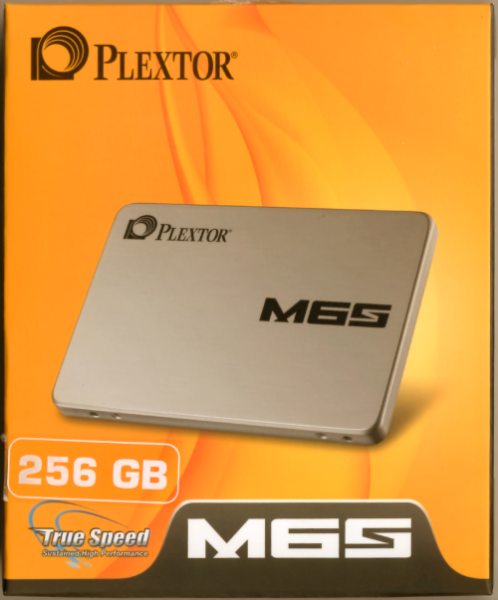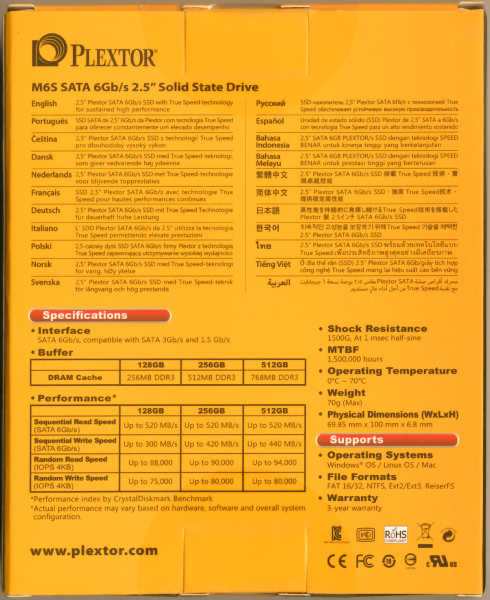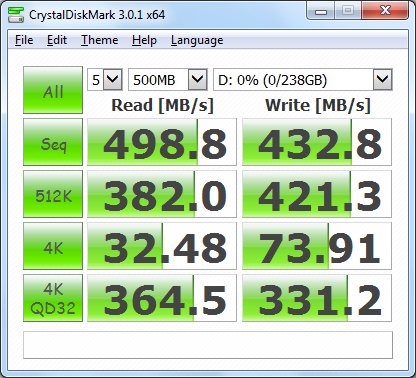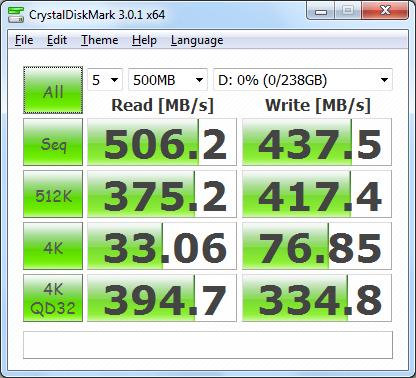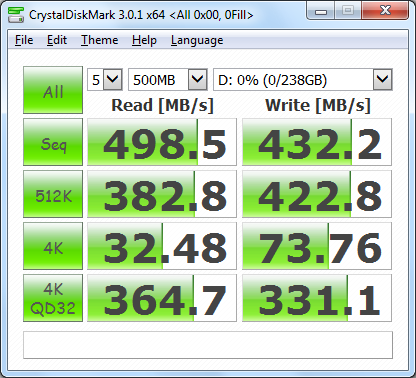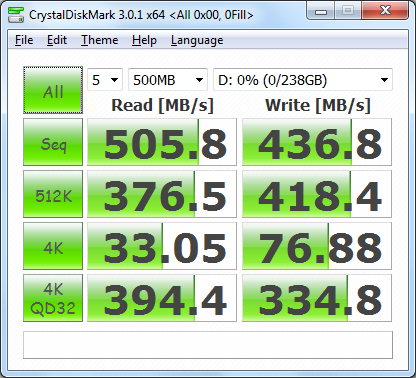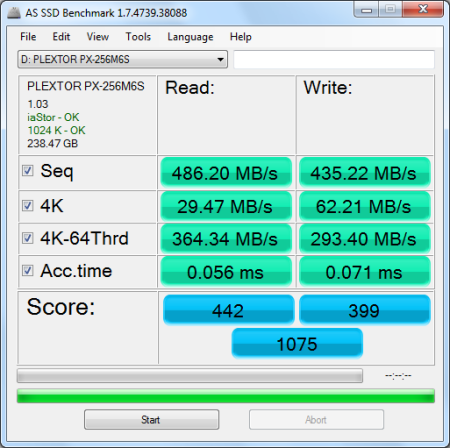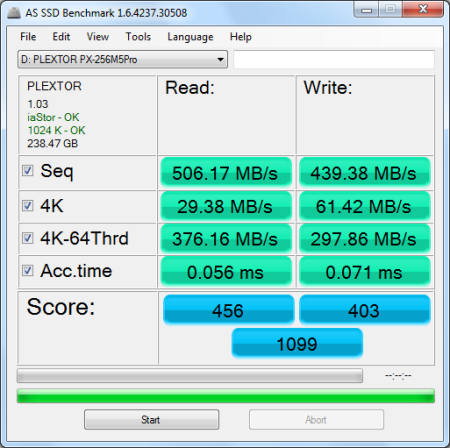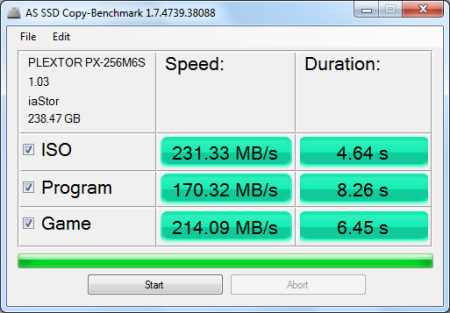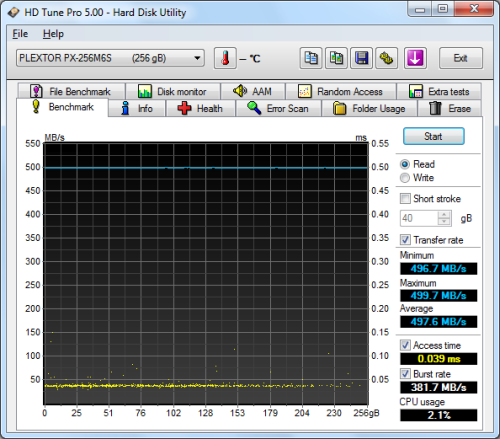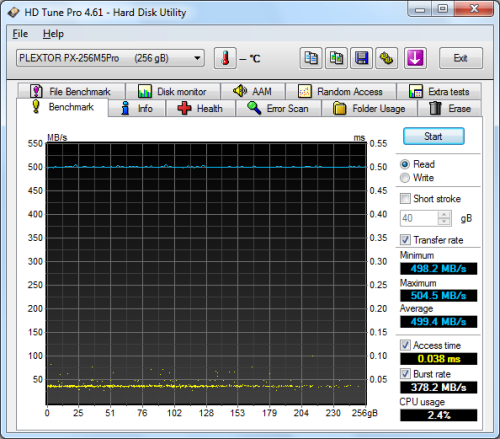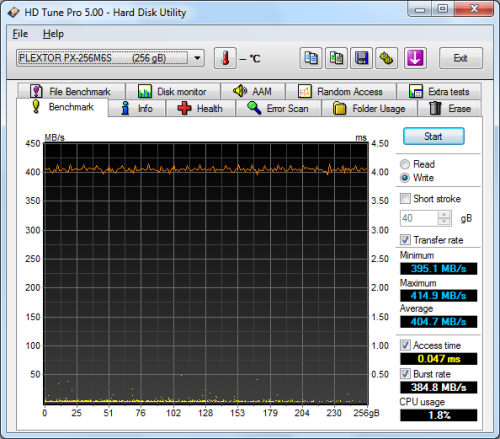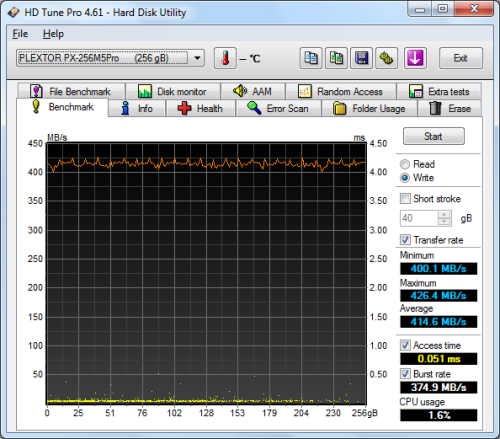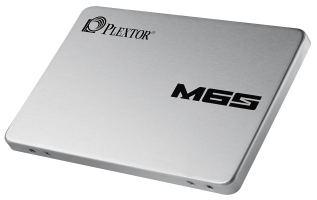

Model: Plextor PX-256M6S 256GB Solid State Drive
Manufacturer: Plextor
Provided By: Plextor LLC
As one of the biggest names in the storage industry, Plextor doesn't need much of an introduction. For more than a decade, they've produced some of the best optical drives the industry has seen. Known the world over for their quality, performance, and features, these drives have become favorites among consumers and professionals alike. Today, Plextor continues to lead the way by bringing cutting edge storage technologies to market. Along with a vast assortment of high-performance DVD and Blu-ray drives, the company offers NAS devices, external hard drives and a growing number of solid state drives.
 At this year's Consumer Electronics Show (CES), Plextor launched its new M6 series SSDs. Along with the mSATA M6S and PCIe M6e, this multi-form factor lineup included the company's latest 2.5-inch SSD, the M6S. This highly efficient, high-performance SSD combines Marvell's 88SS9188 "Monet Lite" controller with Toshiba's Advanced 19nm (A19) Toggle Mode MLC NAND to deliver up to 520MB/s read and 440MB/s write transfer rates. The M6S also features support for Plextor's exclusive True Speed technology as well as the Device Sleep (DEVSLP) standard which extends the battery life of a device by reducing the drive's power consumption to a mere 2 mW when it's not in use.
At this year's Consumer Electronics Show (CES), Plextor launched its new M6 series SSDs. Along with the mSATA M6S and PCIe M6e, this multi-form factor lineup included the company's latest 2.5-inch SSD, the M6S. This highly efficient, high-performance SSD combines Marvell's 88SS9188 "Monet Lite" controller with Toshiba's Advanced 19nm (A19) Toggle Mode MLC NAND to deliver up to 520MB/s read and 440MB/s write transfer rates. The M6S also features support for Plextor's exclusive True Speed technology as well as the Device Sleep (DEVSLP) standard which extends the battery life of a device by reducing the drive's power consumption to a mere 2 mW when it's not in use.
For this review, Plextor sent us the PX-256M6S. This 256GB SSD comes equipped with 512MB of on-board cache and is capable of delivering up to 520MB/s sequential read and 420MB/s sequential write speeds as well as up to 90,000 random read and 80,000 random write IOPS.
| Plextor PX-256M6S 256GB Solid State Drive | |||||||||||||||||||||||||||||||||||
General Specifications
Performance
Power Consumption
Environment and Reliability
Dimensions and Weight
Other Features
|
Needless to say, this is only a taste of what the PX-256M6S has to offer. To give you an idea of what to expect, we'll take a closer look at Plextor's new 256GB SSD and then see how well it performs. Does the PX-256M6S have what it takes? Can it deliver the performance and features that we've come to expect from Plextor? Keep reading as we find out.
The M6S comes in an eye catching, yellow and black box. Along with a picture of the drive, the front advertises a number of its key features including its 256GB capacity and support for Plextor's True Speed technology. The back of the box provides a bit more information regarding its features and specifications.

Plextor doesn't include a lot of extras with the M6S. Aside from the SSD, the only other thing in the box is a small, fold out guide containing warranty information as well as some brief installation instructions for both desktop and notebook computers in a number of different languages.
Physical Features:
Like Plextor's previous SSDs, the M6S is very well constructed. The drive's outer casing is made entirely out of metal. Along with it being strong and durable, it is very lightweight. On top of that, its brushed aluminum finish looks great.
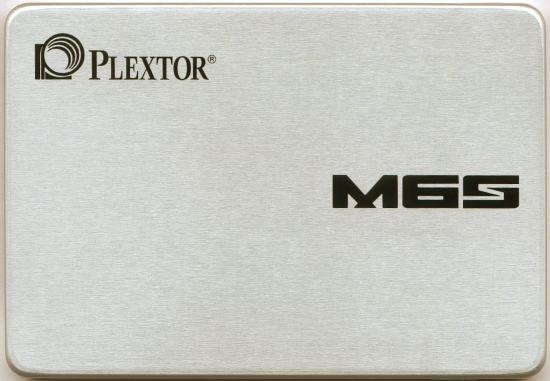
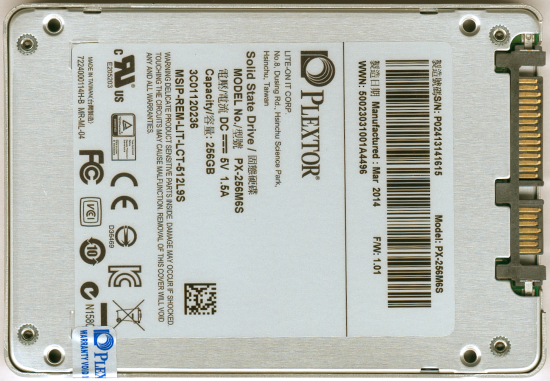
Plextor has reduced the M6S's height from the standard 9.5mm down to 7mm. While that doesn't sound like much, this ultra-slim form factor lets you install the drive in ultrabooks as well as standard laptops and desktop PCs.
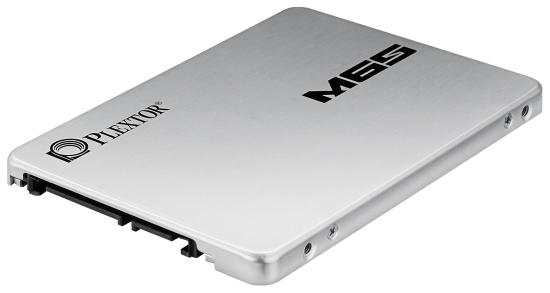
Like the M6M, the M6S uses Marvell's 88SS9188 "Monet Lite" controller. There is very little information available regarding this controller but from what we can gather from our conversations with Plextor, it is very similar to the 88SS9187 "Monet" controller found in the M5M, M5 Pro and M5Pro Xtreme. The biggest difference is that instead of eight NAND flash channels, the 88SS9188 supports only four.
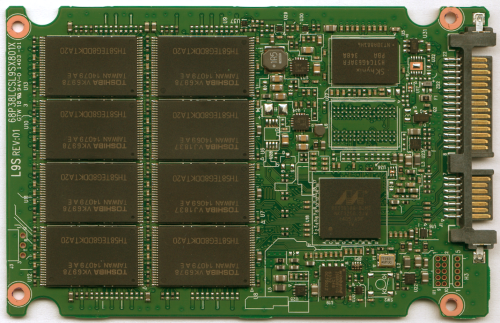
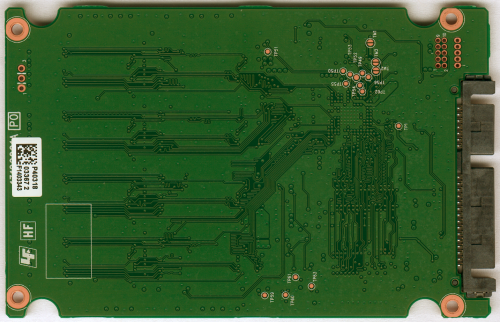
For the PX-256M6S, Plextor has opted to use Toshiba's A19nm TH58TEG8DDKTA20 Toggle Mode MLC NAND flash modules. Looking at the pictures above, you can see that there are eight of these 32GB chips on top of the PCB. The drive also has a single 512MB SK hynix H5TC4G63AFR DDR3 memory chip that is used for caching and garbage collection.
The test system used in this review was an HP 8200 Elite. The computer came equipped with an Intel Core i5-2400 CPU, 4GB of DDR3 1333MHz memory, Seagate Barracuda 7200.12 ST3250312AS 250GB SATA 6 Gb/s hard drive, NVIDIA Quadro FX580 512MB PCIe graphics card and an Intel 82579-LM gigabit network card. For the operating system, I installed a fresh copy of Windows 7 Enterprise.
To test the performance of the Plextor PX-256M6S, I ran a series of benchmarks using CrystalDiskMark 3.0.1, HD Tach RW 3.0.4.0, ATTO Disk Benchmark 2.46, AS SSD, HD Tune Pro 4.61, Anvil's Storage Utilities and Iometer. For comparison, I've also included test results from the Toshiba Q Series Pro, Plextor PX-256M6M, Samsung SSD 840 EVO mSATA, OCZ Vector 150, OCZ Vertex 450, Silicon Power Slim S55, Samsung SSD 840 EVO, Seagate 600 SSD, SanDisk Extreme II, Plextor PX-256M5M, OCZ Vector, Plextor PX-256M5Pro Xtreme, Samsung SSD 840 Pro, Samsung SSD 840, Kingston Ultra Plus, OCZ Vertex 4, OCZ Agility 4 and Kingston HyperX 3K.

Like the M6M, the M5S is based on Marvel's 88SS9188 controller chip. Looking at the screenshot above, you can see that it performs equally well with both incompressible (0%) and compressible (100%) data.
CrystalDiskMark 3.0.1:
First, I ran a few quick tests using CrystalDiskMark. This benchmark tool measures the performance of a storage device by testing its sequential read and write speeds as well as its random read and write speeds using blocks 512K and 4K in size.
According to Plextor, the PX-256M6S is capable of reading at 520 MB/s and writing at 420 MB/s when connected to a SATA 6 Gb/s port. While the drive performed better than expected when writing, it came up a bit short in CrystalDiskMark's sequential read speed test.
The PX-256M6S performed equally well when using highly compressible 0x00 (0 Fill) data. This time around, the drive was able to read at 498.5 MB/s and write at 432.2 MB/s.
HD Tach RW 3.0.4.0:
Next, I used HD Tach to test the PX-256M6S's read, write and burst speeds as well as its seek times and CPU usage.

Looking at the screenshot above, you can see that the PX-256M6S had average read and write speeds of 416.6 MB/s and 362.4 MB/s respectively, as well as a burst speed of 404.0 MB/s.
ATTO Disk Benchmark 2.46:
I also used ATTO Disk Benchmark to test the PX-256M6S's sequential read and write speeds. The tests are run using blocks ranging in size from 0.5KB to 8192KB and the total length set to 256MB.
When tested with ATTO, the PX-256M6S's read speeds topped out at about 523 MB/s and its write speeds at 450 MB/s.
AS SSD:
AS SSD is a relatively new benchmark designed specifically for solid state drives. The application contains five synthetic tests used to determine the sequential and random read and write performance of a drive.
AS SSD also includes a copy benchmark. This test copies an ISO (two large files), program (many small files) and game (small and large files), returning the speed and duration of each.
HD Tune Pro 4.61:
Next, I ran a series of tests using HD Tune Pro. This hard disk utility measures a drive's performance by testing its sequential read and write speeds as well as its access time, burst rate and CPU usage. For this review, I'm also going to use it to benchmark the PX-256M6S's random read and write speeds, random access times and the number of operations per second.
The PX-256M6S performed fairly well when benchmarked with HD Tune. The drive had average read and write speeds of 497.6 MB/s and 404.7 MB/s, respectively, and a burst rate of 381.7 MB/s when reading.
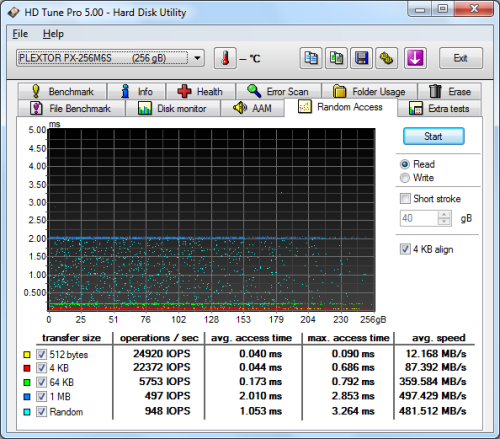 Plextor PX-256M6S - HD Tune Random Access Read |
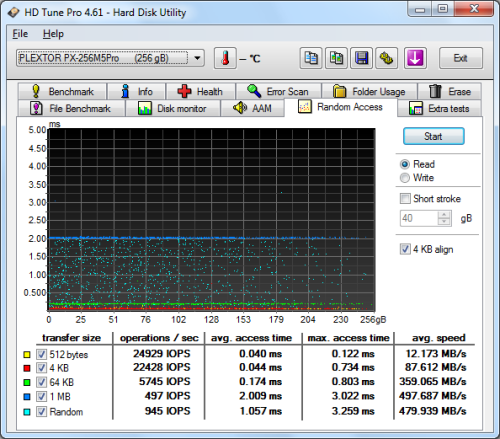 Plextor PX-256M5Pro Xtreme - HD Tune Random Access Read |
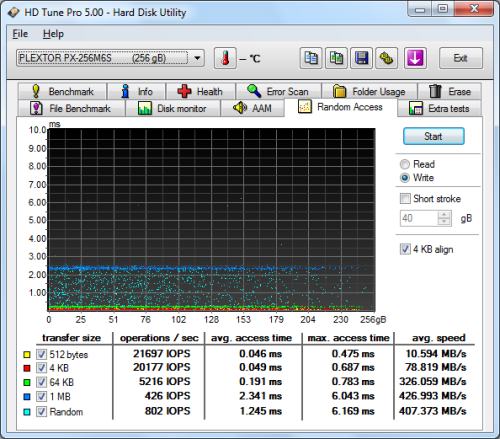 Plextor PX-256M6S - HD Tune Random Access Write |
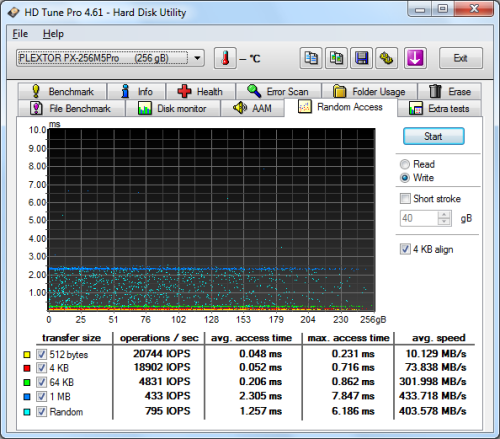 Plextor PX-256M5Pro Xtreme - HD Tune Random Access Write |
The PX-256M6S didn't disappoint when doing random reads and writes. When writing 4KB blocks, the drive reached 20,177 IOPS and had an average speed of 78.819 MB/s. The PX-256M6S was even faster when reading, reaching 22,372 IOPS with an average speed of 87.392 MB/s.
AS SSD:
AS SSD is a relatively new benchmark designed specifically for solid state drives. The application contains five synthetic tests used to determine the sequential and random read and write performance of a drive.
AS SSD also includes a copy benchmark. This test copies an ISO (two large files), program (many small files) and game (small and large files), returning the speed and duration of each.
HD Tune Pro 4.61:
Next, I ran a series of tests using HD Tune Pro. This hard disk utility measures a drive's performance by testing its sequential read and write speeds as well as its access time, burst rate and CPU usage. For this review, I'm also going to use it to benchmark the PX-256M6S's random read and write speeds, random access times and the number of operations per second.
The PX-256M6S performed fairly well when benchmarked with HD Tune. The drive had average read and write speeds of 497.6 MB/s and 404.7 MB/s, respectively, and a burst rate of 381.7 MB/s when reading.
 Plextor PX-256M6S - HD Tune Random Access Read |
 Plextor PX-256M5Pro Xtreme - HD Tune Random Access Read |
 Plextor PX-256M6S - HD Tune Random Access Write |
 Plextor PX-256M5Pro Xtreme - HD Tune Random Access Write |
The PX-256M6S didn't disappoint when doing random reads and writes. When writing 4KB blocks, the drive reached 20,177 IOPS and had an average speed of 78.819 MB/s. The PX-256M6S was even faster when reading, reaching 22,372 IOPS with an average speed of 87.392 MB/s.
TRIM and True Speed:
While SSD's offer many benefits, there are some downsides to using flash memory. One of the biggest issues people run into is performance degradation. Over time, an SSD will run out of fresh blocks and will have to write over data the file system has marked as deleted. This procedure is very complicated and can slow an SSD's write speeds considerably.
To fix this problem, most manufacturers have added TRIM support to their SSDs. The TRIM command allows an operating system, such as Windows 7, to tell an SSD which data blocks are no longer in use. Using this information, the drive pro-actively erases these blocks and adds them to the free block pool.

The M6S is the latest drive to ship with their Plextor's exclusive True Speed technology. By leveraging the power of advanced firmware, True Speed ensures that the SSD works at its full potential even after extensive use and long periods of operation. Along with support for TRIM, the M6S's firmware incorporates Instant-Restore technology and delivers advanced wear-leveling and block management.
To put the PX-256M6S into a "dirty" state, I used Iometer to fill 80% of the drive and then ran a random write test for 30 minutes. Looking at the screenshot below, you can see that the drive's average read and write speeds slowed slightly, dropping to 443.17 MB/s and 425.39 MB/s, respectively.
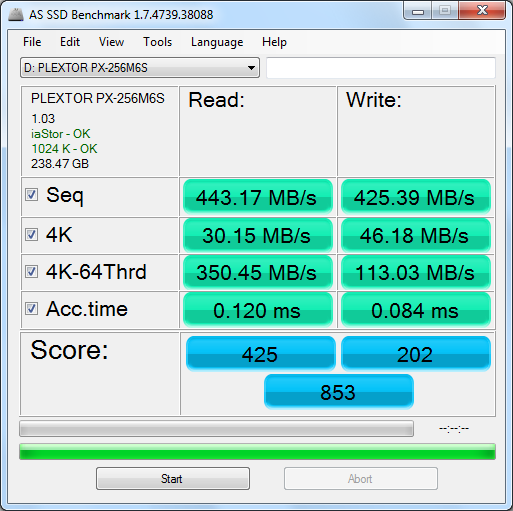
PX-256M6S - Dirty
I let the computer sit for about 45 minutes and then reran the test. The PX-256M6S wasn't able to reach the factory fresh performance shown in our earlier tests. However, its average read speed climbed up to 452.94 MB/s.

PX-256M6S - After TRIM
Lastly, I used Plextor's Plextool software to perform a secure erase of the PX-256M6S. With the drive wiped clean, it had average read and write speeds of 483.99 MB/s and 435.41 MB/s, respectively.

PX-256M6S - Secure Erase
Final Thoughts:
While the M6S isn't Plextor's fastest or most feature packed SSD, it's a great solution for the consumer looking to boost the performance of their existing desktop or notebook computer. Similar to what we saw with the M6M, the M6S combines Marvell's 88SS9188 "Monet Lite" controller with Toshiba's new Advanced 19nm (A19) Toggle Mode MLC NAND flash. The 88SS9188 has half the NAND flash channels as the 88SS9187 "Monet" controller found in the M5M and M5 Pro. However, thanks to a custom firmware, the M6S is still able to deliver a fast, responsive computing experience. In our sequential read and write tests, the PX-256M6S was able to read at speeds as high as 523 MB/s and write at speeds in excess of 432 MB/s. It also did reasonably well in our random write tests, producing more than 61,000 IOPS at low queue depths. Increasing the queue depth did lead to better results. However, the PX-256M6S still had a hard time keeping up with drives like the Samsung 840 EVO.
Fast read and write speeds aren't the only things the M6S has to offer. The drive features Plextor's exclusive True Speed technology, which does a pretty good job of maintaining original performance levels, even after intensive use and long periods of operation. The M6S also supports the Device Sleep (DEVSLP) standard which extends the battery life of a device by reducing the drive's power consumption when it's not in use. Last, but not least, the M6S provides 256-bit AES full disk encryption for data confidentiality.
The M6S is available now in 128GB, 256GB and 512GB capacities. Prices on Amazon.com and Newegg currently range from $80 up to $280, with the 256GB version reviewed here going for less than $140.

Highs:
- Available in 128GB, 256GB and 512GB capacities
- Good sequential read and write performance
- Performs equally well with compressible and incompressible data
- SATA 6Gb/s interface
- Toggle Mode MLC NAND flash
- Large DRAM cache
- Exclusive firmware with Instant Restore, wear-leveling and block management
- True Speed technology provides consistent performance, even after intensive usage
- 256-bit AES encryption
- DEVSLP power mode
- Supports TRIM, SMART and NCQ
- Ultra-slim form factor
- 3 year warranty
- Reasonably priced
Lows:
- Random write performance at low queue depths could be better
- Does not support TCG Opal or eDrive encryption
